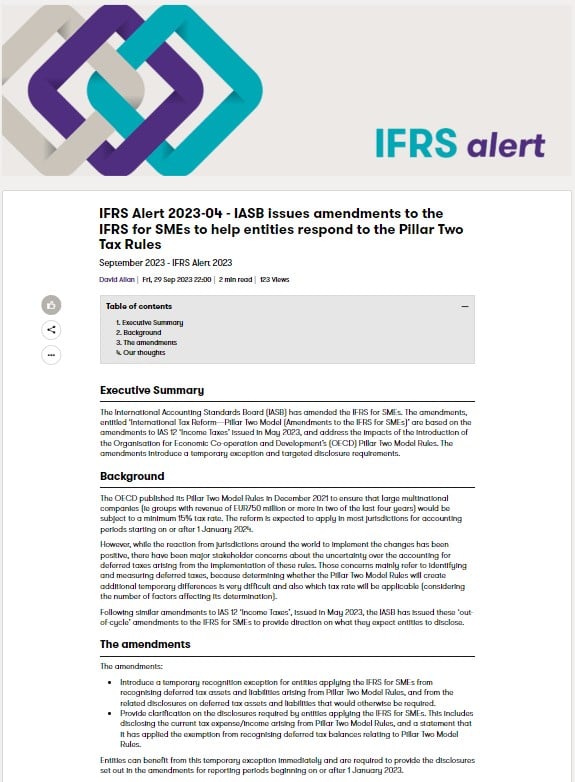IFRS Alert
The International Accounting Standards Board (IASB) regularly publishes new International Financial Reporting Standards (IFRS), Interpretations of Standards (IFRIC) or amendments to existing IFRS Standards.
In response to these, the global IFRS team publishes IFRS Alerts on these changes (and other issues relevant to IFRS) as they are announced so that you can keep up to date.
Grant Thornton International Ltd is pleased to share our Alerts with you below.

Issue |
Topic |
| Issue 2023-04 |
IASB issues amendments to the IFRS for SMEs to help entities respond to the Pillar Two tax rules The International Accounting Standards Board (IASB) has amended the IFRS for SMEs. The amendments, entitled ‘International Tax Reform—Pillar Two Model (Amendments to the IFRS for SMEs)’ are based on the amendments to IAS 12 ‘Income Taxes’ issued in May 2023, and address the impacts of the introduction of the Organisation for Economic Co-operation and Development’s (OECD) Pillar Two Model Rules. The amendments introduce a temporary exception and targeted disclosure requirements. Background However, while the reaction from jurisdictions around the world to implement the changes has been positive, there have been major stakeholder concerns about the uncertainty over the accounting for deferred taxes arising from the implementation of these rules. Those concerns mainly refer to identifying and measuring deferred taxes, because determining whether the Pillar Two Model Rules will create additional temporary differences is very difficult, and also which tax rate will be applicable (considering the number of factors affecting its determination). Following similar amendments to IAS 12 ‘Income Taxes’, issued in May 2023, the IASB has issued these ‘out-of-cycle’ amendments to the IFRS for SMEs to provide direction on what they expect entities to disclose. The amendments
Entities can benefit from this temporary exception immediately and are required to provide the disclosures set out in the amendments for reporting periods beginning on or after 1 January 2023. Our thoughts Similarly, we commend the IASB for moving quickly to extend the guidance and relief to entities who report under the IFRS for SMEs, as they too face uncertainty due to the Pillar Two Model Rules. |
| Issue 2023-02 |
IASB issues amendments to enhance the transparency of supplier finance arrangements The amendments require additional disclosures that complement the existing disclosures in these two Standards. They require entities to disclose:
These additional disclosure requirements address investors wanting more visibility around supplier finance arrangements, which in some jurisdictions around the world are better known are reverse factoring arrangements. The amendments to IAS 7 and IFRS 7 are effective for accounting periods on or after 1 January 2024. Our thoughts |
| Issue 2023-01 |
IASB amends IAS 12 to help entities respond to the 'Pillar Two' tax rules The International Accounting Standards Board (IASB) has issued amendments to IAS 12 ‘Income taxes’ to give entities temporary relief from accounting for deferred taxes arising from the Organisation for Economic Co-operation and Development’s (OECD) international tax reform. The amendments introduce both a temporary exception and some targeted disclosure requirements. Background However, while the reaction from jurisdictions around the world to implement the changes has been positive, there have been major stakeholder concerns about the uncertainty over the accounting for deferred taxes arising from the implementation of these rules. Those concerns mainly refer to identifying and measuring deferred taxes because determining whether the Pillar Two Rules will create additional temporary differences is very difficult and also which tax rate will be applicable (considering the number of factors affecting its determination). Therefore, the IASB has acted quickly to address these concerns and provide direction on what they expect entities to disclose. The amendments:
Entities are able to benefit from the temporary exception immediately as soon as the amendments are published but in providing this exemption they are required to provide the disclosures to investors for annual reporting periods beginning on or after 1 January 2023. However, in some jurisdictions, such as Europe, the endorsement process will probably not be completed before 30 June 2023 resulting in reporting entities operating in jurisdictions where the Pillar Two Rules have been enacted or quasi enacted, being in a situation that the amendments are aiming to avoid. We are of the view that if this happens, reporting entities are able to develop their own accounting policy in accordance with the guidance of Paragraph 10 of IAS 8 ‘Accounting Policies, Changes in Accounting Estimates and Errors’. We consider that the value of the information being provided (ie relevancy, reliability, faithful presentation) is outweighed by the costs of attempting to update the deferred tax balances for Pillar Two Model Rules. Put another way, given these amendments to IAS 12 make it clear that no deferred tax is required to be recognised as a result of Pillar Two Model Rules, trying to identify and estimate any deferred tax for one period (i) in a way that might not be consistent with how other reporting entities would do it and (ii) with the only perspective to reverse it in a following period, may not end up providing reliable, consistent and decision useful information for the users of the financial statements. Our thoughts Considering some jurisdictions around the world have already substantially enacted the Pillar Two Model Rules, we commend the IASB for the speed in which they published these amendments and encourage reporting entities to consider what new disclosures are now required well ahead of any reporting obligations they might have. Listed entities in particular should take into account any views expressed by their local regulator in developing their accounting policy on this matter. |
